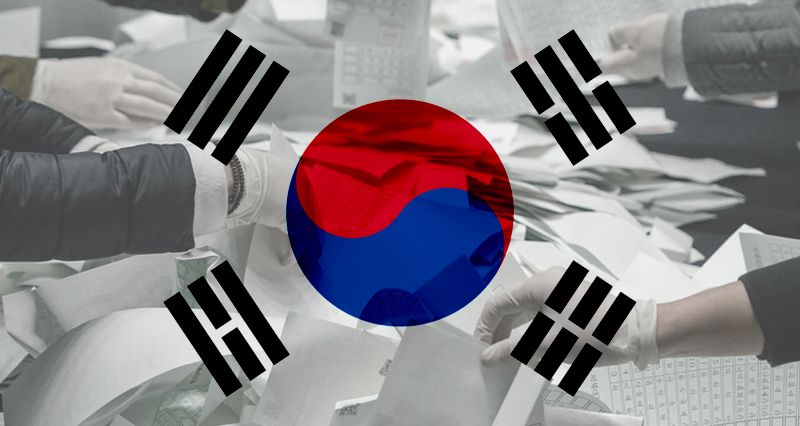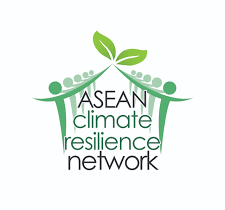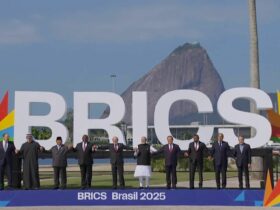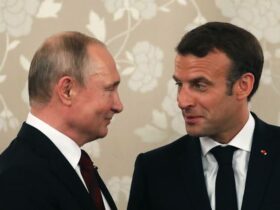By Mehmet Emre Ozturk
According to the official results announced on the South Korean presidential elections, the People Power Party candidate Yoon Seok-yeol is elected into the office. Elected to be the 20th President of South Korea, Yoon managed to get 16,394,815 votes or 48.56%, while his closest rival, Democratic Party of Korea candidate Lee Jae-myung managed to get received 16,147,738 votes or 47.83 %. Yoon has surpassed his rival with only 247,077 votes.
The 61-year old Yoon Seok-yeol has no political background. Being a former public prosecutor, Yoon had been in the middle of a scandal in the South Korean public opinion right before the election, his wife allegedly being involved in forgery of some government documents.
What kind of a change to expect in South Korea?
Preferred by the conservatives, Yoon had promised during his campaign to provide more dominant and active roles to the ministers within the parliamentary system. However, this promise is considered unlikely to be actually realized. Yoon’s rival, the Democrat Party will, though having lost the presidency, have more seats in the parliament. Yoon and his party, who have claimed that the Moon Jae-in government had failed against the Covid-19 pandemic, have promised an effective struggle against the pandemic, while cases in the country were approaching to 400,000 every day.
Among all these promises and claims, the most notable rhetoric and the one that actually caught the young voters, has been the one given on housing. Yoon said he would supply a total of 2.5 million homes in his five-year term, which became a beam of hope for the South Koreans. However, for this plan to be realized, parliament must pass a “Restructuring for housing supply law” in the first place. The Democratic Party (DPK), which will become the new opposition party this term, has a majority of 169 seats in parliament until the date of the new parliamentary elections on April 10th 2024, which could prevent the People’s Power Party (PPP) from making legislative changes by a parliamentary decree.
The president of the Seoul Estate Association, Professor Seo Jin-hyeong stated in an interview with the Business Newspaper “Some of these things can be amended easily since there is an administrative measure. I think that the legislation is needed to be reviewed, in order to stop the rise in housing prices and to regulate the estate purchasing prices. That is why I do not think that the semi-finished construction operations will be terminated until this law is amended”.
Did the gender equality crisis split the votes?
One of the promises of made by Yoon’s People Power Party is the complete annulation of the Ministry of Gender Equality and Family Affairs. The ministry budget amounts to two thousandths of the government’s total budget. Less than 3 percent of the ministry budget actually goes to efforts to strengthen the equality for women. Yoon stated during his election campaign that he would implement this program, in order to win the support of young male voters who think there is not a systemic sexism in the nation.
However, it is also argued that this is a strategy that will have an impact on female voters in particular, and would split the votes. Justice Party candidate Sang Sang-jung, who advocated in favor of women’s rights in the election, which was decided with a difference of only 247,078 votes, came out with 802,308 votes or 2.37% of the votes.
How will the foreign policy be shaped?
Yoon’s stance on foreign policy consists of some steps that would strengthen the grip of the United States in the Asia-Pacific. Conservatives, who are more hawkish towards China than the Democrats, may be more likely to include South Korea in pacts such as the Quadrilateral Security Dialogue or known as QUAD.
Arguing that the alliance with the US should have a wider range of cooperation – including Seoul’s national security, technology and climate issues – Yoon met with a group led by Kathleen Stephens, the former US Ambassador to Seoul in the midst of the election campaign, while expressing his hopes that the alliance would be expanded further.
On the other hand, Yoon stressed that Seoul should be an active participant in efforts to form a coalition of countries that share the values of democracy, human rights and a rule of international law and order.
How will the relations with Democratic People’s Republic of Korea take shape?
Yoon and his party could trigger a stressful period in relations between the two Koreas. The former Democratic Party government had argued that a policy of peace and unification with North Korea could be achieved through dialogue and had been in efforts to open a path to diplomatic channels. Moon Jae-in and the North Korean leader Kim Jong-un had met in the village of Panmunjom on the buffer zone of the two countries, on April 27th 2018, and signed the Panmunjom Declaration for Peace, Prosperity and Unity of the Korean Peninsula. Moon’s visit to Pyongyang and the summit in Singapore has shown that the two countries may be able to manage some processes through diplomatic channels.
But there is a different scenario in the case of the new Yoon Seok-yeol government. The conservative Yoon administration argues that it is not possible to achieve peace with North Korea, and that the only way to unify with the North is to eliminate the Kim family and the Workers’ Party of Korea.
Relations with China and the policy of balance of power
There is concern and caution among the Chinese public media regarding Yoon. This is because, unlike the Moon Jae-in administration, which had been trying to achieve a policy of balance between the United States and China, the diplomatic commitments of the Yoon administration are very close to the United States. Especially the deployment of the THAAD systems in South Korea, or strengthening the QUAD cooperation, is perceived as an important security threat over China.
The relations between Seoul and Beijing are not expected to be significantly strained, since China makes up of 25 % of South Korea’s foreign trade volume. But relations are speculated to be severed rapidly as it did with the THAAD crisis of 2016.
About the elections in South Korea, the Chinese Foreign Ministry spokesman Zhao Lijian stated, “We congratulate Yoon Seok-yeol as the new President of South Korea. Our contacts are ongoing”, while adding that the upcoming process will closely be followed.

















Leave a Reply